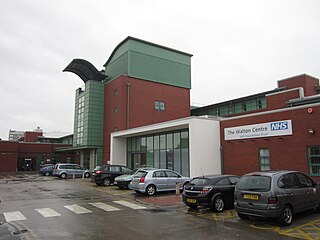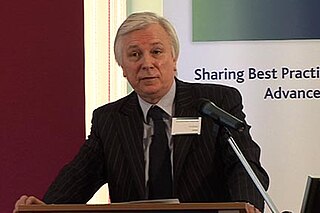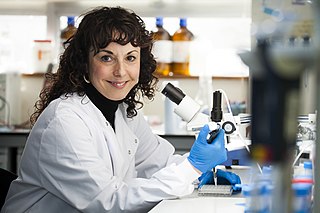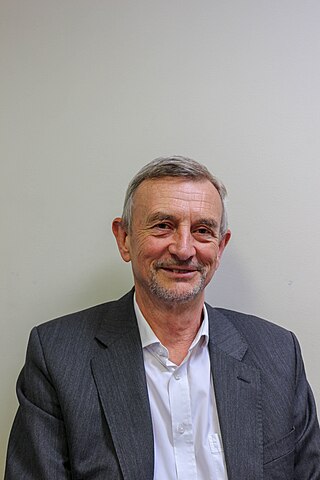Related Research Articles
Angela Vincent is Emeritus professor at the University of Oxford and a Fellow of Somerville College, Oxford.

Neurology is the branch of medicine dealing with the diagnosis and treatment of all categories of conditions and disease involving the nervous system, which comprises the brain, the spinal cord and the peripheral nerves. Neurological practice relies heavily on the field of neuroscience, the scientific study of the nervous system.


The Institute of Psychiatry, Psychology and Neuroscience (IoPPN) is a research institution dedicated to discovering what causes mental illness and diseases of the brain. In addition, its aim is to help identify new treatments for them and ways to prevent them in the first place. The IoPPN is a faculty of King's College London, England, previously known as the Institute of Psychiatry (IoP).

The Walton Centre, formerly known as the Walton Centre for Neurology and Neurosurgery, is a major neurology hospital located in the suburb of Fazakerley in the city of Liverpool, England. It is one of several specialist hospitals located within the Liverpool City Region alongside Liverpool Heart and Chest Hospital, Alder Hey Children's Hospital, Liverpool Women's Hospital, Mersey Regional Burns and Plastic Surgery Unit and Clatterbridge Cancer Centre. The wards in the hospital are all named after pioneering neurosurgeons in the 20th and 21st century. It is managed by the Walton Centre NHS Foundation Trust.

Queen Square is a garden square in the Bloomsbury district of central London. Many of its buildings are associated with medicine, particularly neurology.
University College London Hospitals NHS Foundation Trust (UCLH) is an NHS foundation trust based in London, United Kingdom. It comprises University College Hospital, University College Hospital at Westmoreland Street, the UCH Macmillan Cancer Centre, the Royal National ENT and Eastman Dental Hospitals, the Hospital for Tropical Diseases, the National Hospital for Neurology and Neurosurgery, the Royal London Hospital for Integrated Medicine and the Royal National Throat, Nose and Ear Hospital.
The Leslie Oliver Oration is held annually at the Queen's Hospital, London. The lectures are named after Leslie Oliver who founded the Neurosurgical Unit at Oldchurch Hospital in Essex in 1945. In addition, he was one of the early practitioners of functional neurosurgery in the United Kingdom, writing several articles on the surgical management of Parkinson’s disease.
The National Prion Clinic (UK) is part of the University College London Hospitals NHS Foundation Trust. Its aim is to diagnose and treat patients with any form of human prion disease (Creutzfeldt-Jakob disease, CJD). In addition, the clinic facilitates research in diagnostics and therapeutics, organises clinical trials, and counsels those with an increased genetic risk of the disease.

Andrew John Lees FRCP FRCP(G) FMedSci is Professor of Neurology at the National Hospital for Neurology and Neurosurgery, Queen Square, London and University College London. In 2011 he was named as the world's most highly cited Parkinson's disease researcher.

The UCL Queen Square Institute of Neurology is an institute within the Faculty of Brain Sciences of University College London (UCL) and is located in London, United Kingdom. Together with the National Hospital for Neurology and Neurosurgery, an adjacent facility with which it cooperates closely, the institute forms a major centre for teaching, training and research in neurology and allied clinical and basic neurosciences.

Sarah Joanna Tabrizi FMedSci is a British neurologist and neuroscientist in the field of neurodegeneration, particularly Huntington's disease. She is a Professor and Joint Head of the Department of Neurodegenerative Diseases at the UCL Institute of Neurology; the founder and Director of the UCL Huntington's Disease Centre; a Principal Investigator at the UK Dementia Research Institute at UCL; and an Honorary Consultant Neurologist at the National Hospital for Neurology and Neurosurgery, Queen Square, London, where she established the Multidisciplinary Huntington's Disease Clinic. The UCL Huntington’s Disease Centre was officially opened on 1 March 2017 by UCL President and Provost Professor Michael Arthur.
QS Enterprises Ltd in Queen Square, Central London is a wholly owned trading subsidiary of the University College London Hospitals Charity. It was the first health sector social enterprise of its kind in the United Kingdom and remains one of the few independent organisations working for the direct benefit of an NHS institution. Since 1985, QS Enterprises Ltd has donated in excess of £25 million to the Charity for the benefit of the hospitals that make up the University College London Hospitals NHS Foundation Trust.

Dimitri Michael Kullmann is a professor of neurology at the UCL Institute of Neurology, University College London (UCL), and leads the synaptopathies initiative funded by the Wellcome Trust. Kullmann is a member of the Queen Square Institute of Neurology Department of Clinical and Experimental Epilepsy and a consultant neurologist at the National Hospital for Neurology and Neurosurgery.
Mary M. Reilly FRCP is an Irish neurologist who works at National Hospital for Neurology and Neurosurgery. She studies peripheral neuropathy. She is the President of the Association of British Neurologists.
Sonia Gandhi is a British physician and neuroscientist who leads the Francis Crick Institute neurodegeneration laboratory. She holds a joint position at the UCL Queen Square Institute of Neurology. Her research investigates the molecular mechanisms that give rise to Parkinson's disease. During the COVID-19 pandemic, Gandhi was involved with the epidemiological investigations and testing efforts at the Francis Crick Institute.
Miratul Muqit FRSE FMedSci is a British neurologist and a Programme Lead at the MRC Protein Phosphorylation and Ubiquitylation Unit (MRCPPU) in the School of Life Sciences at the University of Dundee. His research focuses on the study of the PINK1 gene, mutations in which are a major cause of Parkinson's disease.

Martin Neil Rossor, is a British clinical neurologist with a specialty interest in degenerative dementias and familial disease.
Alan J. Thompson, MD, FMedSci, FRCP, FRCPI, is Dean of the Faculty of Brain Sciences at UCL; Pro-Provost for London at UCL; Garfield Weston Professor of Clinical Neurology and Neurorehabilitation at the UCL Queen Square Institute of Neurology. He is also a consultant neurologist at the University College London NHS Hospitals Foundation Trust working at the National Hospital for Neurology and Neurosurgery. He is Editor-in-Chief for Multiple Sclerosis Journal.
David John Werring is a British physician, neurologist, and academic specialising in stroke. He is professor of Neurology at the UCL Queen Square Institute of Neurology and current head of Stroke Research Centre and the department of Brain Repair & Rehabilitation at UCL.
References
- ↑ "Queen Square Centre for Neuromuscular Diseases". Cnmd.ac.uk. 3 October 2012. Retrieved 11 August 2015.
- ↑ "Mike Hanna". Cnmd.ac.uk. 3 October 2012. Retrieved 11 August 2015.
- ↑ Michael G. Hanna's publications indexed by the Scopus bibliographic database. (subscription required)
- ↑ Andreu, Antoni L.; Hanna, Hi Michael G.; Reichmann, Heinz; Bruno, Claudio; Penn, Audrey S.; Tanji, Kurenai; Pallotti, Francesco; Iwata, So; Bonilla, Eduardo; Lach, Boleslaw; Morgan-Hughes, John; Shanske, Sara; Sue, Carolyn M.; Pulkes, Teeratorn; Siddiqui, Asra; Clark, John B.; Land, John; Iwata, Momi; Schaefer, Jochen; DiMauro, Salvatore (1999). "Exercise Intolerance Due to Mutations in the CytochromebGene of Mitochondrial DNA". New England Journal of Medicine. 341 (14): 1037–1044. doi: 10.1056/NEJM199909303411404 . PMID 10502593.
- ↑ Jouvenceau, Anne; Eunson, Louise H; Spauschus, Alexander; Ramesh, Venkataswaran; Zuberi, Sameer M; Kullmann, Dimitri M; Hanna, Michael G (2001). "Human epilepsy associated with dysfunction of the brain P/Q-type calcium channel". The Lancet. 358 (9284): 801–807. doi:10.1016/S0140-6736(01)05971-2. PMID 11564488. S2CID 5698667.
- ↑ "Fellowships - Skills & careers - Medical Research Council". Mrc.ac.uk. 9 June 2015. Retrieved 11 August 2015.
- ↑ "Britain's best hospitals: A patients' guide - Features - Health & Families" . The Independent. 20 March 2008. Archived from the original on 12 May 2022. Retrieved 11 August 2015.
- ↑ "UCL Institute of Neurology". Ucl.ac.uk. Retrieved 11 August 2015.
- ↑ Horvath, R. (2006). "Phenotypic spectrum associated with mutations of the mitochondrial polymerase gene". Brain. 129 (7): 1674–1684. doi:10.1093/brain/awl088. PMID 16621917.
- ↑ "Queen Square Centre for Neuromuscular Diseases". Cnmd.ac.uk. 3 October 2012. Retrieved 11 August 2015.
- ↑ "Top Teacher and Administrator Awards 2010-11". Ucl.ac.uk. Retrieved 11 August 2015.
- ↑ "Professor Hanna invited to give prestigious ANZAN Lecture". Ucl.ac.uk. 8 April 2011. Retrieved 11 August 2015.
- ↑ "ANZAN". Archived from the original on 27 February 2015. Retrieved 22 June 2015.
- ↑ "Guarantors of Brain". Guarantors of Brain. Retrieved 11 August 2015.
- ↑ "American Neurological Association (ANA)". Myana.org. Retrieved 11 August 2015.
- ↑ Zuberi, S. M. (1999). "A novel mutation in the human voltage-gated potassium channel gene (Kv1.1) associates with episodic ataxia type 1 and sometimes with partial epilepsy". Brain. 122 (5): 817–825. doi: 10.1093/brain/122.5.817 . PMID 10355668.